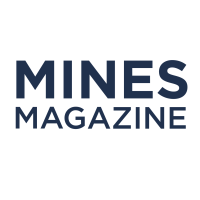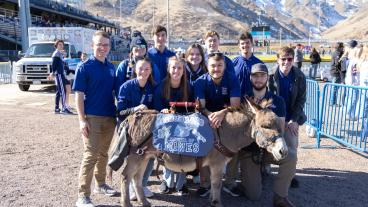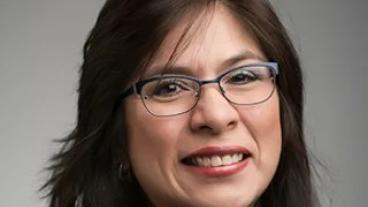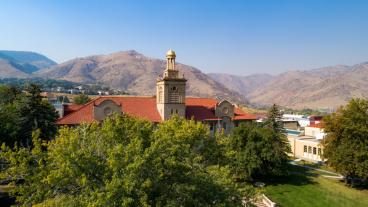Shark Box Theatre Company puts Mines creativity, entrepreneurship in the spotlight
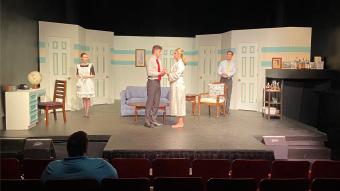
Actors perform in the dress rehearsal for Shark Box Theatre Company’s production of Boeing, Boeing.
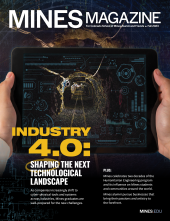
If there's one thing to know about Mines graduates it's that they love to create, be it a new technology, a new business or a piece of art. Mark Walden ’18, Makenzie Parimuha ’18 and Dalton Metz ’20, the founding members of Golden, Colorado-based Shark Box Theatre Company, are no exception.
Shark Box Theatre Company was first conceived when the trio–and other Mines students–were involved in Mines Little Theater productions. “Kenzie, Abby Hentges and I had this dream that one day we were going to make ‘Mines Bigger Theater,'” Walden said.
After they graduated and went on to pursue careers in engineering fields, they were all still looking for that creative outlet and opportunity to express themselves in areas outside their professional lives. In 2021, they got the theater company up and running with their first production, Boeing, Boeing.
We recently talked with Walden, Parimuha and Metz about the process of starting a local theater company, how their engineering backgrounds have enabled them to be resilient through challenges and the value the arts brings to them and their local community. Here is some of what we learned.
Starting Shark Box Theatre Company required entrepreneurial skill, and the hardest part was learning to ask for help–and adapting to new situations.
Establishing a new theater company requires more than deciding what to perform and hiring actors to fill a stage. It takes everything from creating a business plan and fundraising to building the sets and creating costumes. And that often requires help from others.
“I wanted to do everything and have my hands in every part of the process and make it all perfect,” Walden said. “But there is a zero percent chance any of it could have happened without the constant help of everyone’s families, neighbors and friends. Taking my foot off the throttle and asking for that help and really appreciating that people really wanted to help was essential.”
And to add an extra challenge to getting up and running is the fact that the theater company uses different theaters for their productions and often requires creative problem solving to make the transition between rehearsal and final production seamless.
“We jump from theater to theater, but we do have a dedicated rehearsal space. However, that rehearsal space is often not the same shape or size of any of the stages we’ve been on,” Walden explained. “We’ve had to design all our sets so they can be as close to reality as possible in our rehearsal space and translate over to the stage and not be too different.”
An engineering background and a Mines education has come in handy for addressing these new challenges as they’ve come up.
From the puzzle of moving sets into a variety of new spaces to handling the lighting and sound, adaptability and the ability to learn new processes and technologies has been key.
“Mines didn’t train me in this exact software,” Walden said when discussing the systems he’s had to learn to use in each production. “They did train me how to learn. I learned similar software, so I was able to pull from my experiences and adapt to new situations as fast as I could.”
“I was also part of a lot of different clubs and organizations at Mines, and they all taught me how to be philanthropic and a lot of the conflict-resolution skills that have been important in this business,” Walden said.
With a small company, all the players often have to wear multiple hats and collaborate to bring a production together–skills Mines instilled from their first day on campus. “Pretty much everyone at every level has their main job, whether it be codirector or stage manager or actor,” Parimuha said. “But because of the nature of a small theater company, you have to do more than that. You have to be thinking about what other people in the show need, like costuming and stage dressing and lighting. It really is a team effort.”
Pursuing interests beyond their professional lives allows for more opportunities to be creative and build community in new ways.
The trio agrees that engaging in activities outside their day-to-day lives is essential for living a balanced life and keeping their creativity sharp.
“I think having a place where you can go and get out of the left side of your brain and relax and do things that are separate from engineering and everything we do on a daily basis is important,” Metz said.
“Everybody has the ability to create, to empathize, to express themselves in new ways,” Parimuha said. “And continuing to explore that side of yourself through creative means is super impactful on your overall mental wellbeing and outlook on life.”
And these benefits extend beyond the performers to include the audience as well.
“We’re not just giving ourselves a creative outlet,” Walden said. “We’re giving an entire community a reminder that we can co-exist as a society and that there is beauty in the world. There is something fun we can hold onto.”

